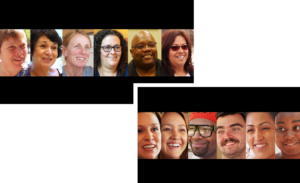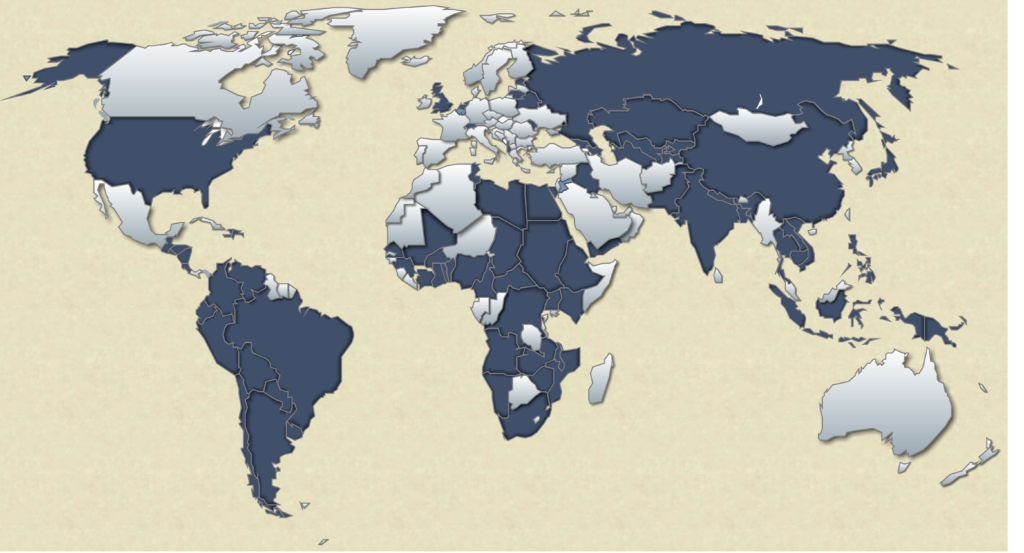Over LTG’s history, we have been honored to receive recognition for the quality and impact of our work. Some of the recognitions and kudos are shared below.
Praxis Awards
The Washington Association of Professional Anthropologists (WAPA) established the Praxis Award for Excellence in the Practice of Anthropology in 1981. The biennial, professionally juried award recognizes expertise in translating anthropological knowledge into action as reflected in a single project. In December 2017, LTG Associates earned its 6th Praxis recognition making LTG the single most honored group in Praxis history. Three of the projects (asterisked below) are highlighted in a book on the Praxis Awards:
- LTG has been recognized six times by the Praxis awards for excellence in “translating anthropological knowledge into action to address their clients’ problems”.
- LTG has consistently been recognized by clients for the complexity, quality, and accessibility of its work.
- LTG’s Managing Partners were awarded the 2021-2022 Kimball Award which “honors exemplary anthropologists for outstanding recent achievements that have contributed to the development of anthropology as an applied science and that have impacted public policy”.
Praxis 2017: Video Ethnography*
 The LTG team worked with professional videographer Erick Lee Cummings to develop two ethnographic videos. LTG co-created the videos with community leaders engaged in innovative community health projects and parents in poor conditions working to raise healthy families. “Being the Change” interviewed professionals providing cutting-edge services to families and communities. “Raising Up the Children” examined how low-income parents across the state of California confront challenges to raise healthy children.
The LTG team worked with professional videographer Erick Lee Cummings to develop two ethnographic videos. LTG co-created the videos with community leaders engaged in innovative community health projects and parents in poor conditions working to raise healthy families. “Being the Change” interviewed professionals providing cutting-edge services to families and communities. “Raising Up the Children” examined how low-income parents across the state of California confront challenges to raise healthy children.
Each video creates a forum for the participants to speak directly to power from a position of strength. They were designed to bring the faces and voices of participants and their worlds into direct relations with policymakers, program developers, and legislative staff and legislators for the State of California. These videos have been used for briefings, trainings, and policy and program development.
This project could have been carried out by other professionals, but the anthropological difference began with LTG’s reframing of the community participant-focused research questions to center on families and their lived experience and context. It continued through the identification and recruitment of participants through the use of social networks. The video interviews and creation of the presentations depicted the lives of individuals that were then validated by the participants, closing the loop from interview to data to analysis to final video production.
Praxis 2015: Pastors at Risk Evaluation*
2015 Honorable Mention for LTG’s project for The Duke Endowment – “Pastors at Risk: Toward an Improved Culture of Health for United Methodist Clergy in North Carolina”.
LTG was tasked by The Duke Endowment (TDE) to provide external evaluation of the pilot program and the intervention that consisted of three staggered clergy cohorts, as well as another CHI pilot program that targeted the Pastor-Parish Relation Committees (PPRCs), consisting of local church members that work with the pastor. The entire intervention over the five years of clergy experience became known as “Spirited Life,” and over 1,000 clergy participated across North Carolina.
Our involvement in CHI’s developmental stages allowed us to present our anthropological perspective regarding the importance of understanding sociocultural context by focusing on cultural values and language, and considering the range of affected and affecting stakeholders, thereby taking a holistic approach to clergy health. We understood the pastor to be an individual, influencing a church community as a faith leader through word and deed. We also recognized and accounted for pastors as individuals who lived and functioned within a personal community of family, friends, and their congregations, who are both affected by and affect the pastor. And we addressed pastors as professionals working within a faith organization with its own philosophy and culture.
Praxis 2009: WHO Decent Care Development*
2009 Honorable Mention for LTG’s project for the World Health Organization -“Decent Care: Shifting the Health Paradigm.”
The projects were the development, dissemination, and implementation of a global, values-based concept of health called “Decent Care” which places the affected person at the center as the director of needed the services and support. Core values of Decent Care are agency and dignity, with agency placing emic vision and direction of needed care and support in the hands of the affected person. The concept has been developed, dissemination begun, and pilot initiatives developed around the world. The nominated anthropologists were central to concept development, dissemination, and to design of implementation efforts.
At every point from the pilot through the final cohort of Spirited Life, the anthropological approach and insights that LTG brought contributed to the form and functioning of the CHI. Without a holistic vision of the pastor and the whole of the Church, the CHI would have likely remained a weight and associated problem-focused employee health program. With this vision and active engagement, the initiative had the information critical to effectively refining and refocusing and engaging all of the stakeholders in creating a culture of health within a sanctioned and supportive space.
To see so many clergy take seriously the need for better health, I just think that culturally the CHI has had an effect on the Conference, and I think that’s really good.
Group One Clergy
Praxis 2007: WHO Collaborative Fund Evaluation
2007 First Place Award for work with the World Health Organization – “Evaluation of the Collaborative Fund for HIV/AIDs Prevention.”
LTG was contracted to design and implement a global evaluation of a new organization with regional decision-making bodies, and grant-making processes and program implementation at local levels. Anthropological methods allowed for learning and functioning effectively at all levels simultaneously; appropriately creating or enhancing the capacity of the global, regional, and grantee organizations to value, plan, and implement monitoring and evaluation activities; and, developing and reporting information that was useful to all stakeholders from the WHO to the front-line provider. The anthropologically based evaluation and capacity building allowed the WHO and others to value the work of People Living with HIV/AIDs in new ways.
Praxis 1989: Community Based Organization (CBO) – Community Development Corporation (CDC)
1989 Honorable Mention for Southeast Asian Refugee Community Leadership, Orange County, California – “Development of an Effective Immigrant Community Development Organization.” Supported refugee leadership in developing a cross-community CBO. The leadership wanted to provide services that were not then being funded by the government or private sectors and so LTG helped the organization – Community Resources Opportunity Project (CROP) to gain development funding from the Ford Foundation and then to design and develop a community development corporation to provide the needed services using resources generated by CROP-owned businesses that benefited the communities.
Praxis 1985: Refugee Mutual Assistance Association Development Support
1985 Honorable Mention for work with Lao Family Community of Fresno, California – “Development of a Southeast Asian Refugee Mutual Assistance Association: Bridging Cultures and Producing Results.”

LTG has worked globally for more than two decades. For the U.S. Agency for International Development, LTG held both the POPTECH and MEDS contracts for five years and for a significant period, the contracts ran in tandem. LTG utilized that time to create a high degree of crossover between the two projects, thereby expanding the reach of each project, ensuring the maximum utilization of experts, and achieving cost savings for USAID. The projects worked in partnership with cooperating agencies, nongovernmental and multilateral organizations, international organizations, and independent consultants to support the Global Health Bureau of USAID. The services of the projects were experience-based and systematic, reflecting state-of-the-art thinking, proven best practices, and multiple stakeholder perspectives. The projects provided support to USAID Global Health and USAID missions in planning, design, research, monitoring, evaluation, communication of lessons, and outcomes. LTG provided worldwide support to USAID in these efforts. The POPTECH project conducted approximately 250 tasks for USAID in the areas of:
- Design and conduct of evaluations and assessments;
- Documentation and dissemination of lessons learned;
- HR strengthening/short term staffing;
- Sharing and applying knowledge and experience;
- Linking knowledge and quality assurance; and,
- Developing accessible and available information and sharing with stakeholders.
LTG provided strategic planning support both in Washington and at missions around the world to support USAID’s improvement in policy and program development.
The performance based POPTECH project was found to be consistently excellent by USAID over many evaluation periods in each of the measures of its performance. POPTECH also received overwhelmingly positive evaluations from Missions, from consultants, and from other organizations with which it worked. LTG’s performance on POPTECH, a complex, global contract, was rated as exemplary for each of the eight performance periods. The following were performance ratings for the five years with the highest possible rating being “excellent”:
The MEDS Project (Monitoring, Evaluation, Design, & Support) was a five-year effort and conducted approximately 150 tasks for USAID, and had at its core the following work areas:
- Project and activity design
- Project and program evaluations
- Support for technical meetings
- Project monitoring and analysis
- Proposal reviews
- Information dissemination
- Strategic and technical expert advisory groups
- Literature reviews
- Proposal reviews
MEDS’ accomplishments were marked by the volume and breadth of technical support, including support to 23 Missions (spanning all four USAID regions) and four bureaus (three regional bureaus plus the Bureau of Humanitarian Response (BHR)) in a wide range of technical areas. Of the 23 Missions and three regional bureaus that used MEDS services, ten Missions and two regional bureaus plus the BHR were repeat users, an indication that they valued the technical support services provided.
Both of these projects clearly reflect the corporate vision of LTG – a focus on transparency, accountability, and performance at all levels of program and policy in all of its international and domestic work.



